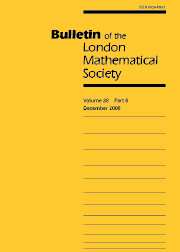Crossref Citations
This article has been cited by the following publications. This list is generated based on data provided by
Crossref.
Dubickas, Artūras
2005.
There are infinitely many limit points of the fractional parts of powers.
Proceedings Mathematical Sciences,
Vol. 115,
Issue. 4,
p.
391.
Dubickas, Artūras
2006.
On the distance from a rational power to the nearest integer.
Journal of Number Theory,
Vol. 117,
Issue. 1,
p.
222.
Dubickas, Arturas
2006.
On the fractional parts of the natural powers of a fixed number.
Siberian Mathematical Journal,
Vol. 47,
Issue. 5,
p.
879.
Dubickas, A.
2006.
Divisibility properties of certain recurrent sequences.
Journal of Mathematical Sciences,
Vol. 137,
Issue. 2,
p.
4654.
Schinzel, Andrzej
2006.
On the reduced length of a polynomial with real coefficients.
Functiones et Approximatio Commentarii Mathematici,
Vol. 35,
Issue. none,
Dubickas, Artūras
2007.
On a sequence related to that of Thue–Morse and its applications.
Discrete Mathematics,
Vol. 307,
Issue. 9-10,
p.
1082.
Schinzel, Andrzej
2007.
On the reduced length of a polynomial with real coefficients, II.
Functiones et Approximatio Commentarii Mathematici,
Vol. 37,
Issue. 2,
Dubickas, Artūras
2007.
Arithmetical properties of linear recurrent sequences.
Journal of Number Theory,
Vol. 122,
Issue. 1,
p.
142.
DUBICKAS, ARTŪRAS
2008.
An Approximation by Lacunary Sequence of Vectors.
Combinatorics, Probability and Computing,
Vol. 17,
Issue. 3,
p.
339.
Akiyama, Shigeki
Frougny, Christiane
and
Sakarovitch, Jacques
2008.
Powers of rationals modulo 1 and rational base number systems.
Israel Journal of Mathematics,
Vol. 168,
Issue. 1,
p.
53.
Dubickas, Artūras
2008.
On the powers of 3/2 and other rational numbers.
Mathematische Nachrichten,
Vol. 281,
Issue. 7,
p.
951.
DUBICKAS, ARTŪRAS
2009.
ON THE FRACTIONAL PARTS OF RATIONAL POWERS.
International Journal of Number Theory,
Vol. 05,
Issue. 06,
p.
1037.
DUBICKAS, ARTŪRAS
2009.
ON INTEGER SEQUENCES GENERATED BY LINEAR MAPS.
Glasgow Mathematical Journal,
Vol. 51,
Issue. 2,
p.
243.
Dubickas, Artūras
2009.
An approximation property of lacunary sequences.
Israel Journal of Mathematics,
Vol. 170,
Issue. 1,
p.
95.
Drungilas, Paulius
and
Dubickas, Artūras
2009.
Roots of Polynomials of Bounded Height.
Rocky Mountain Journal of Mathematics,
Vol. 39,
Issue. 2,
Dubickas, Artūras
2009.
Prime and composite integers close to powers of a number.
Monatshefte für Mathematik,
Vol. 158,
Issue. 3,
p.
271.
Kaneko, Hajime
2010.
On Normal Numbers and Powers of Algebraic Numbers.
Integers,
Vol. 10,
Issue. 1,
Dubickas, Artūras
2010.
On the distribution of powers of a complex number.
Archiv der Mathematik,
Vol. 95,
Issue. 2,
p.
151.
Zhuravleva, V. V.
2013.
On the two smallest Pisot numbers.
Mathematical Notes,
Vol. 94,
Issue. 5-6,
p.
820.
Журавлeва, Виктория В
and
Zhuravleva, Viktoriya V
2013.
О двух наименьших числах Пизо.
Математические заметки,
Vol. 94,
Issue. 5,
p.
784.


